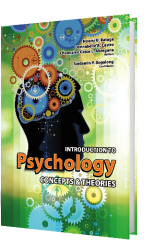-

A Simplified Approach to General Psychology 2011 (6 by 9) (Dela Cruz)
Authors: Lucia B. Dela Cruz, Jay R. Amacio, Belinda C. Silverio, Cesar A. Esteban, Jr.
As part of die general education curricula in the tertiary level, General Psychology is one of the most loved courses because of its definite scope in explaining the uniqueness of every human being. Writing a book about the basics in exploring the world of Psychology is both an easy and a difficult task. It is easy because a number of primary and secondary sources of information are available locally and internationally. On the other hand, coming up with a material that specifically attacks the fundamental issues about the discipline is quite an arduous challenge. One would have a hard time deciding which among the bulk of information can provide the target recipients of the publication, comprehensive discussions and cultural applications.
The second edition of this book. “A Simplified Approach to General Psychology,” is a continuous byproduct of the authors' observations and extensive teaching experiences. Additional discussions in the book were provided which still are results of what actually transpired in their respective classrooms. Some changes done in this book were based on the observations and opinions of the students who experienced using this book in the past semesters. The authors realized that there are more significant ideas that should be included in order to satisfy the students' needs.
Relatively, this book will help students to have a practical understanding of related concepts and principles since more real-life examples and visual images are provided. It will be very beneficial to the visual learners. The book's simplicity, however, does not compromise the quality of the discipline; it only made
-

General Psychology 2013 (Birion)
Authors: Juan C. Birion, Marilou C. Asturias, Elmer G. De Jose, Jane Marie M. Dimacisil, Percival B. Salise, Jonathan B. Tinio, Jan Joseph Villegas
In writing this book, we believe that an introductory- course in psychology should provide clear understanding of what psychologists study, how they think and how they work. We also have a feeling that the teaching of an introductory psychology should cover wide and general topics fitting for a one-semester course covering as many topics that would be useful especially to those who would embark in advanced studies in this interesting academic field_ That is the reason why fifteen chapters are included in this book touching on topics of interest of the various schools of thoughts with varying perspectives. We do not intend to be eclectic, but we believe that psychology should not be structured and retarded due to boundaries in such a way that would hamper new knowledge and discoveries to emerge. Our understanding of human behavior should be continuing through intensive research and let novel theories and assumptions grow since human activities continue to change brought about by new gadgets and technology.. The student should'. able to gain much knowledge of facts and principles governing human behavior_ This is our gain
This book is truly a group effort. Two psychology professors from the Polytechnic University of the Philippines, Dr. Juan C. Birion who leads the group, together with Prof. Elmer G. De Jose, Assistant to the Vice President for Research; Vice President of Student Affairs of the Rizal Technological University, Dr. Marilou C. Asturian Prof. Jane Marie M. Dimacisil, professor of psychology and philosophy at the University of Perpetual Help-Biñan, Laguna (UPHL); Prof. Percival B. Salise, psychology professor of the University of Manila: Prof. Jonathan B. Tinio, Program Coordinator of the Psychology Unit of the College of Arts and Sciences at Holy Angel University-Angeles City. Pampanga; and Dr. Jan Joseph Villegas, International Lecturer of Psychology and Biological Sciences at the Asia Pacific Region. We were involved in the book's production in one way or another_
This book may not be the perfect book as we envisaged, but it is certainly an adequate representation of the most important areas in psychology. Hopefully, it will advance understanding of human behavior and will lead to newer, snore encompassing and more -useful principles governing human behavior. Its distinct features compared with other books in circulation are the inclusion of topics on history of psychology in the Philippines, and with some special topics on human development, intelligence and cognitive psychology, counseling psychology, social psychology and psychological assessment. Photographs of noted psychologists were illustrated so that students and readers will get familiar to them. Special types of exercises and techniques could help teachers vary in their approaches to teaching and make these approaches interesting and meaningful to students. A general psychology hook should develop in the students the attitude of studying human behavior in a scientific way that psychology is a science. It is to these students that this book is aimed, and it is hoped that the features of the text will help reach its targets.
-

Introduction to Pscyhology(Bataga)
Authors: Noemi U. Bataga, Donnabelle, A. Castro, Charmaine Grace L. Abregana
Contributor: Saidamin P. Bagolong
The purpose of this textbook is to serve as an introductory course in Psychology. The book contains eleven chapters covering the basics of Psychology. In addition, this is designed to facilitate the integral development of students for them to understand concepts on human development, behavior, emotion and motivation as well as the salient features of intelligence and personality thereby realizing the fullness of individuals.
Even though this is an introductory textbook, we see to it that the students will learn to appreciate how Psychology can help them to see themselves as members of the community.
This is not just a compilation of concepts and theories but also constitutes a field that can make a difference in your life, in your communities and in our world.
This textbook could not have been written without help from many people whose ideas we have borrowed, modified and incorporated. To them we are especially indebted.
